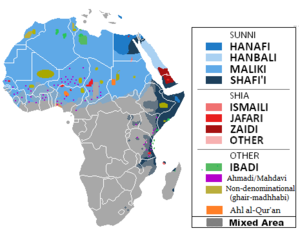
| Islam by country |
|---|
 |
|
|
Islam is the largest religion in Morocco, with more than 99% of the population adhering to it. The largest subset of Muslims in Morocco are Maliki Sunni; other numerous groups include practitioners of Zahirism and non-denominational Muslims. Islam is the nation's state religion. Blasphemy against Islam is a punishable offense.[1]
YouTube Encyclopedic
-
1/5Views:53 637123 32944 1182 376 69323 916
-
Islam in Morocco!
-
10 Surprising Facts About Morocco
-
Reciting Quran in Qatar World Cup | Fatih Seferagić | Islam is beautiful | Morocco fans #worldcup
-
Most Muslim country in the world??
-
Masha'Allah.🥰🥺🇲🇦 Players of Morocco bow down in sujood after defeating Belgium. #islamic #islam
Transcription
History
Islam was first brought to Morocco in 681 A.D. by an Arab invasion under the Uqba ibn Nafi, who was a general serving under the Umayyads of Damascus. In 788, The Shia Idrisids who espoused pro Zaydi views ruled large parts of Morocco. Their contemporaries included the heretical Barghawata state and the Khariji state of Sijilmasa. After several Berbers formed more powerful Islamic dynasties that reigned over the country. Among them were the Almoravids (1040–1147), who was the first to unite Morocco, as well as significant regions in West Africa, Spain and Algeria. The Almoravids were responsible for making the Malikii school of Islamic jurisprudence the most prominent in Morocco. It was later under Almohad rule (1121-1269) that smaller Muslim sects were persecuted and orthodox Sunni Islam became prevalent across the country.[2][3][4]
In 2016, the government developed a strategy to further adherence to the Maliki Islamic school of thought. Religious education had textbook passages deemed promoting violence removed from the curriculum. As a result, religious textbooks had 24 lessons compared to the former 50.[5][6]
Practice

According to Pew, 99% of Muslims in Morocco are Sunni predominantly of the Sunni Maliki madhab, or school of thought, whilst the remaining 1% adhere to other sects such as Shia, Quranism, ibadism etc.[7] The administration of King Mohammed VI has combated the influence of Salafism via a state program where 100,000 imams will go to the country's 50000 mosques and promote the moderate Islam of the Maliki madhab.[8] Morocco has a large Salafi movement, notable figures among it include Omar al-Haddouchi and Hassan Kettani. There are also adherents to the Quranist creed in Morocco, such as the author Rachid Aylal.[9][note 1] published a critical book on Bukhari's work in 2017, Sahih Al-Bukhari… The End of a Legend. It was banned in Morocco for disturbing spiritual security, purportedly due to pressure from Islamists.[10]
See also
Notes
- ^ the source uses the phrase baynal quraniyiin wa bukhariyiin (between Quranists and Bukharists) to describe his own position and that of his detractors
References
References:
- ^ "Morocco and Western Sahara".
- ^ . Qantara http://www.qantara.de/webcom/show_article.php/_c-476/_nr-1132/i.html.
{{cite web}}: Missing or empty|title=(help)[dead link] - ^ "Shia'ism in Morocco || Imam Reza (A.S.) Network". Archived from the original on 2010-06-12. Retrieved 2010-11-02.
- ^ "MO* Magazine - MO.be". Archived from the original on 2011-07-22. Retrieved 2010-11-02.[art_id]=24583&cHash=e64aaa807d
- ^ Vidino; et al. (2018). DE-RADICALIZATION IN THE MEDITERRANEAN - Comparing Challenges and Approaches (PDF). Milano: ISPI. pp. 69–70. ISBN 9788867058198. Archived (PDF) from the original on 2018-08-24. Retrieved 2019-03-19.
- ^ "FOCUS - Morocco reforms religious education to fight extremism". France 24. 2016-12-13. Archived from the original on 2018-12-27. Retrieved 2018-12-27.
- ^ "Legal System - Morocco". Emory Law School - Hungary. Archived from the original on 2008-12-01. Retrieved 2008-12-26.
- ^ Avni, Benny (2015-08-13). "Fighting terror Bogart-style: How Morocco counters radical Islam". New York Post. Archived from the original on 2017-06-13.
- ^ "رضا يوسف احمودى: بين "القرآنيين" و"البخاريين" حوار أم جدل؟ - رأي اليوم". Archived from the original on 2020-07-07. Retrieved 2020-07-06.
- ^ "Morocco Bans a Book Critical of Al-Bukhari as it Threatens Spiritual Security". 20 April 2018. Archived from the original on 2020-04-11. Retrieved 2020-04-11.
Bibliography:
- Burke III, Edmund (2014). The Ethnographic State: France and the Invention of Moroccan Islam. Oakland: University of California. ISBN 978-0520273818.
- Cornell, Vincent J. (1998). Realm of the Saint: Power and Authority in Moroccan Sufism. Austin: University of Texas. ISBN 978-0292712102.
- Eickelman, Dale F. (1976). Moroccan Islam: Tradition and Society in a Pilgrimage Center. Austin: University of Texas. ISBN 978-0292750258.
- Eickelman, Dale F. (1985). Knowledge and Power in Morocco: The Education of a Twentieth-Century Notable. Princeton: Princeton University Press. ISBN 978-0691025551.
- Geertz, Clifford. (1968). "Islam Observed: Religious Development in Morocco and Indonesia" . Chicago: The University of Chicago Press.ISBN 978-0226285115
- Munson Jr., Henry. (1993). " Religion and Power in Morocco" . New Haven: Yale University Press. ISBN 978-0300053760
- Terem, Etty. (2014). "Old Texts, New Practices: Islamic Reform in Modern Morocco". Stanford: Stanford University PressISBN 978-0804787079
